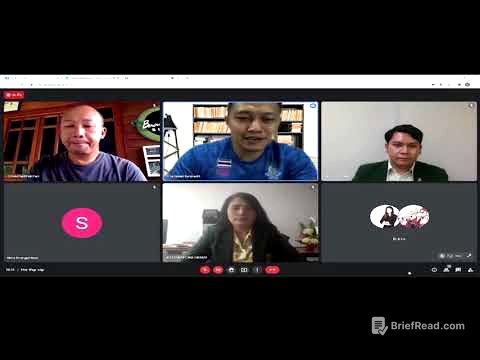TLDR;
This video discusses the challenges faced by freelancers in the modern gig economy and provides strategies for survival and success. It covers the autonomy paradox, the importance of relational labor over hope labor, the impact of competition and ratings, the need for skill diversification, and ways to overcome work instability and platform dependence. The video emphasizes the importance of adapting to the evolving freelance landscape and building a sustainable, independent career.
- The autonomy paradox: Freelancers often work longer and more demanding hours despite the promise of freedom.
- Relational labor: Building relationships with clients is more effective than simply hoping for repeat work based on good performance (hope labor).
- Skill diversification: Developing skills adjacent to your core skill can make you more valuable to clients.
- Platform dependence: Building an independent presence outside of freelance platforms is crucial for long-term stability and negotiation power.
Introduction [0:00]
The video introduces the evolving landscape of freelancing, noting that while it once offered freedom and flexibility, the rise of major platforms has led to increased challenges for freelancers. These platforms, designed to connect those seeking work with those needing it done, have inadvertently created an environment where freelancers are often overworked and underpaid. The video aims to explore these structural problems and provide strategies for freelancers to adapt and succeed in this changing environment.
The Autonomy Paradox [1:12]
The autonomy paradox describes the situation where freelancers, despite theoretically having control over their work, often end up working longer and more irregular hours. They face demanding clients who expect them to be available at all times. This contrasts with the initial appeal of freelancing, which promised freedom and flexibility. The current freelance environment often requires compromises that can lead to burnout unless freelancers learn to adapt to the rapidly changing conditions.
Hope Labor vs Relational Labor [3:49]
The video contrasts "hope labor" with "relational labor." Hope labor is the mindset that doing a good job will automatically lead to future work, similar to the corporate 9-to-5 world where putting in time is expected to be rewarded. Relational labor, on the other hand, involves actively managing and building relationships with clients. Freelancers who engage in relational labor tend to perform better than those who rely solely on hope labor.
Competition [7:31]
Freelance platforms foster intense competition by allowing clients to hire anyone from anywhere. This makes it difficult for freelancers to raise their rates. The ease of entry for new freelancers, who often undercut experienced workers due to a lack of understanding of the value of their services, further exacerbates the problem. Many clients, especially in creative fields, struggle to gauge the quality of work, leading them to prioritize price over quality. This forces freelancers to work more for less money to meet their income goals.
Ratings [10:31]
Good ratings are essential for securing work on freelance platforms, requiring freelancers to dedicate significant time and effort to these platforms. This creates a vulnerability, as clients gain leverage through the threat of negative reviews. Platforms often favor clients in rating adjudications because clients are the ones paying the platform. This power dynamic can force freelancers to concede to unreasonable demands to avoid negative feedback that could damage their reputation.
Reputational dependence [12:24]
Freelancers often concentrate their efforts on a single platform to accumulate a high number of ratings, making them more attractive to clients. However, this creates a dependency that can be detrimental if the platform changes its terms or if the freelancer's account is terminated. Investing all energy into one platform can trap freelancers, limiting their options and making them vulnerable to the platform's policies.
Diversifying your skillset [14:22]
Successful freelancers recognize that their work involves more than just their core skill. They develop skills adjacent to their primary expertise. Clients often seek freelancers who can handle multiple aspects of a project, even if they are not the absolute best in each area. The more diverse a freelancer's skill set, the better they can meet client needs and secure work.
Work Instability [17:03]
Freelancers often experience cycles of pitching, securing work, delivering, and then pitching again, leading to instability. To combat this, it's crucial to transition from "hope labor" to "relational labor" by viewing clients as personal relationships rather than faceless entities. Building relationships, asking for feedback, and being upfront about limitations can lead to repeat business and stability.
Cure your platform dependence [19:22]
To maintain mental health and professional growth, freelancers should establish an independent presence outside of freelance platforms. While starting on a platform is acceptable, developing a personal brand and direct client relationships is essential for negotiating better terms and achieving platform independence. This involves creating a space where they can deliver quality work and nurture business relationships.
Finding the right information [21:11]
Freelancers need to be discerning about the information they use to improve their business. Platforms provide data that primarily benefits them, not necessarily the freelancers. Instead, freelancers should seek distributed mentorship in online communities and collect feedback directly from clients to understand their needs and improve the quality of their work.
What can you do right now? [22:39]
To thrive in the competitive freelance world, continuous self-improvement is essential. While grinding it out as a gig worker is an option, developing solopreneur skills can lead to better financial outcomes and improved mental well-being. Seeking support systems, such as career coaching, can also help freelancers develop the necessary skills and strategies for success.









